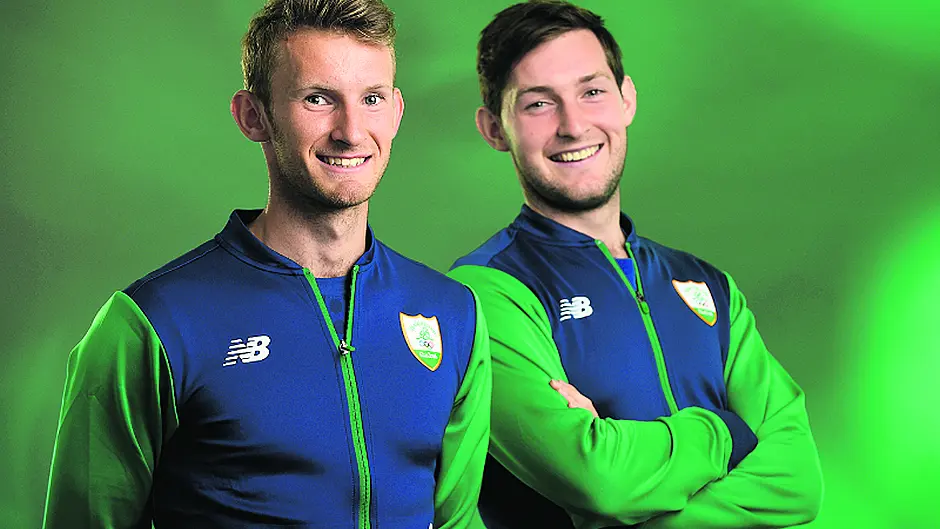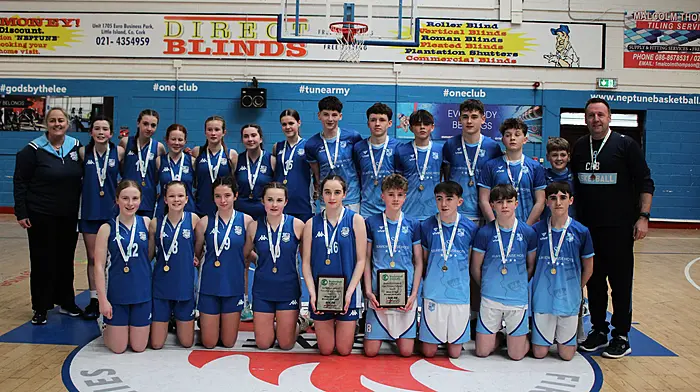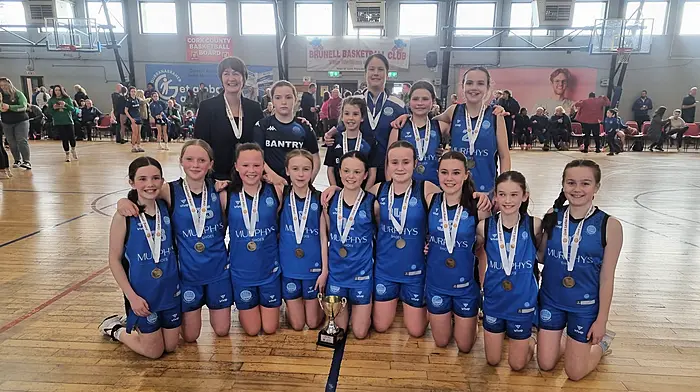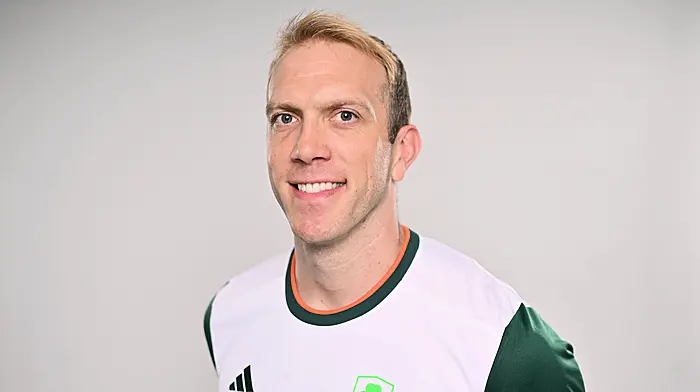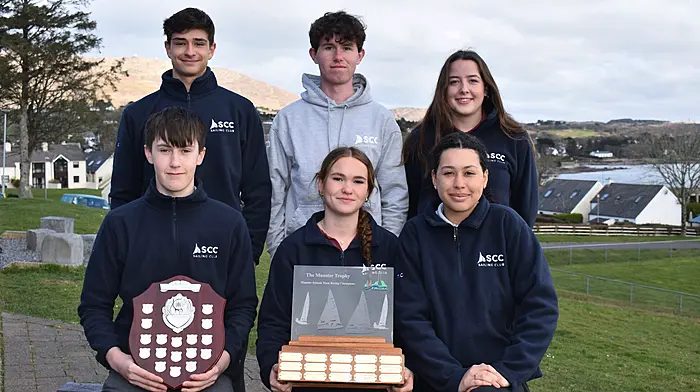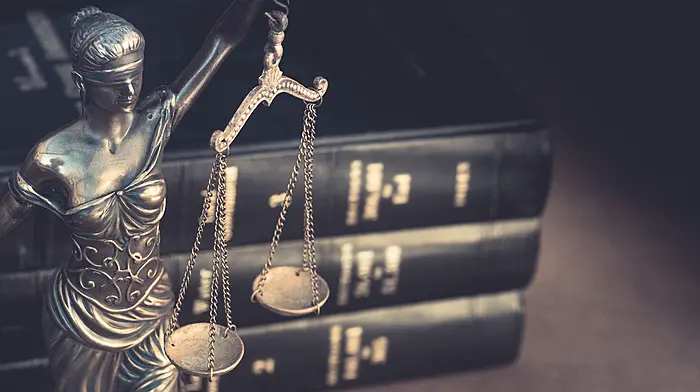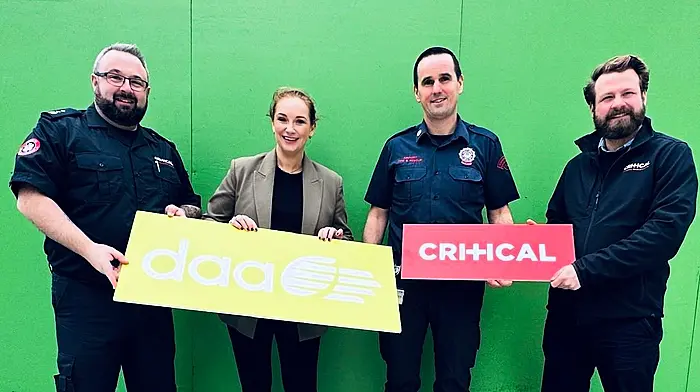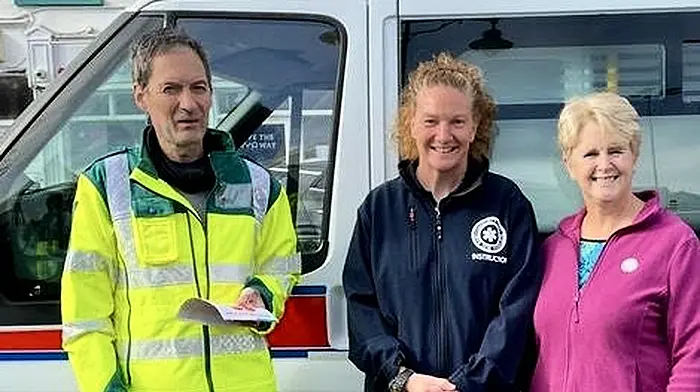They’re brothers, friends and teammates, and now they’re Irish Olympians. KIERAN McCARTHY sat down with Gary and Paul O’Donovan before they jetted out to the Games in Rio to chat about all things rowing, including the time when they caused war on the river …
They’re brothers, friends and teammates, and now they’re Irish Olympians. KIERAN McCARTHY sat down with Gary and Paul O’Donovan before they jetted out to the Games in Rio to chat about all things rowing, including the time when they caused war on the river …
GARY O’Donovan hasn’t let his coach Dominic Casey forget about the time he was banned from Skibbereen Rowing Club for a week.
Looking back now, Gary admits that he probably deserved it.
His younger brother Paul still laughs at it, admitting that Skibbereen’s newest Olympians danced on the wild side when they were younger, jostling for position on the Ilen River and trying to make their mark at the Skibbereen club.
They wanted to be the alpha males.
‘It wasn’t just us,’ Paul protests, still laughing, ‘Shane (O’Driscoll) and Diarmuid (O’Driscoll) were as bad!’
Paul’s taking everyone down with him and Gary.
Back then and new to their teenage years, the four best friends, who grew up within shouting distance of each other’s homes in Lisheen, were inseparable, glued together in a quad, except for the week where Gary and Diarmuid got banned.
Mild-mannered Dominic Casey had enough of their ‘messing’. The punishment was enforced: seven days off the water and away from the club.
‘We used to end up fighting with everyone,’ Paul laughed.
‘Dominic was always threatening to kick us out of the rowing club. There was one time then when Gary and Diarmuid were doing the worst of it – I can’t remember what they were doing, there was so much messing – and they got banned from the rowing club for a week.’
Lesson learned, Gary?
‘Not exactly,’ he jokes.
‘Dad (Teddy) used to coach the four of us when we were younger, but if any one of us caused a fuss, he would pull us from the boat, make us sit on the launch and the other three would have to finish out the session without the fourth man.’
Even now, there’s a roguery to Gary (23) and Paul (22), a fun side that lets them step outside their rowing bubble, like last September when they partied with Republic of Ireland striker Robbie Keane in the VIP section of Copper Face Jacks in Dublin on the Monday night after they qualified for the Olympics. They have the selfies to prove it.
It’s not all work and no play.
***********************
HE might be the younger brother but Paul is as tough as it gets. Gary agrees, without hesitation.
‘He’s immensely strong, mentally and physically. It’s insane,’ says Gary, who has been playing catch-up for several years.
Paul has dreamed about being an Olympian since he was 12 years old. Gary decided in 2012 he wanted it too, a lifestyle change he made outside a Cork city nightclub in the early hours of the morning after a night out during the summer of the London Olympics. A bit worse for wear, he decided there and then that he was setting his sights on the Rio Olympics.
Gary has spent the last few years closing the gap to Paul, the faster of the two who won a bronze medal at the 2013 U23 world championships.
At the Cork Regatta in June, Paul rubberstamped his position as the top single sculler in the country with an eight-second win over Gary – and Paul will represent Ireland as a lightweight single sculler at the world senior rowing championships in Rotterdam at the end of the month.
Paul raced in a single scull from 2011 to 2014, and he was successful, but it’s not an Olympic boat. To get to Rio, he needed a bigger boat, and after trials for the lightweight double sculls in September 2014, the Skibbereen brothers came out on top, with clear water between themselves and the chasing pack.
That was when the plan for the 2016 Olympics was hatched, and they targeted a top-11 finish at the 2015 senior world championships in France as their route to Rio. Last September, it was mission accomplished, as they took the eleventh and final Olympic qualification place on offer at the worlds.
‘We have rowed together since we were youngsters, we’ve been in quads together, we have the same body composition, similar styles, so we blend in nicely,’ Gary explained.
‘The big challenge for us fitting together, because Paul has so much international experience from the single scull, was that Paul was much tougher than I was when it came to racing.
‘I had to learn to keep up with his physical strength coming down the race course. I still struggle. He is immensely strong. It’s insane. They reckon he is one of the strongest, if not the strongest lightweight rower, in world rowing.
‘There’s physical strength but you need the mental strength to go with it. All the strength in the world is no good to you unless you can apply it going down the course over 2,000m. Paul is phenomenal at it.
‘We’ve had races this season when we’re coming towards the finish, when you would be at your limit, and I would think that I can’t do much more, but then I feel this huge surge of power coming from Paul. Out of nowhere the boat starts lifting up. That gives me the drive to find some more. I’ve learned to match his toughness and apply myself even more, during races and training.’
****************************
LOVE hurts, they say, but so does the love for your sport, especially rowing.
It’s a 2,000m race where every muscle and fibre in your body is taking beyond the limit, and it hurts.
‘It’s something you learn to deal with,’ Gary says.
‘When I went to my first U23 world championships, I couldn’t deal with the pain, I thought it was the worst thing ever. I finished 12th in the double that year with Shane, and I remember saying “I hate this, I don’t want to be here, this is horrible”. I loved rowing but I hated the pain. But now we’re used to it, you go through the course and you don’t think about it. It’s there but you keep going.’
Gary and Paul push themselves to the limit, and then beyond.
‘During the race, it is unbelievably hard towards the end. It hurts. It burns. After the race, and we’re sitting on the slider seats, you can’t actually bend your legs up and move them,’ Paul adds.
No pain, no gain, lads.
****************************
AHEAD of the Olympics that burst into life this Friday, Gary, Paul and Dominic spent several weeks at a training camp in Banyoles in northern Spain before flying out to Rio last week.
They look to get the most out of every training session and every race – and it’s been that way since the very start when their father put an oar in their hands once they were big enough to hold it.
‘Most people start rowing when they are 11 or 12, but we started younger – I was eight years old, Paul was seven,’ Gary explained.
Paul takes up the story: ‘I remember the first day he brought us out, it was a big training double, it was a big wide boat – one you’d start off in so you wouldn’t capsize it. Gary caught one end of it, I caught the other but we couldn’t lift it, so dad had to drag it down by himself, and put us into it. We loved it straightaway.’
Their father, Teddy, was involved in Skibbereen Rowing Club, first as a novice rower who raced domestically and then as a coach, and he passed on his passion and knowledge to his eager sons, who lapped it up.
Soon, Gary and Paul were making their own waves.
‘We used to always train in the quad with Shane and Diarmuid, and we were successful domestically. We dominated. At U14 level, we were miles ahead of everyone else in our category, and we used to race the U16s as well,’ Gary recalled.
At the 2008 Home International Regatta, the O’Donovan brothers and Shane O’Driscoll won a gold medal representing Ireland, and their stock was rising – but they were also causing ‘war on the river’ at home in Skibbereen ...
****************************
PAUL: ‘Years ago in Skibbereen we used to train with the older guys – John Whooley, Kenneth McCarthy, Richard Coakley, and Eugene Coakley and Tim Harnedy would be about every so often. (Richard, Eugene and Tim are former Olympians). We’d be in our quad (Paul, Gary, Shane and Diarmuid) and we’d be hell-bent trying to beat them in their singles. There used to be war on the river.’
Gary: ‘Richard was the top boat in the country at the time, he would come down to Skibbereen on the weekends, he’d be in a single and we were only small and in a quad.’
Paul: ‘Kenneth, John and Richard would be racing on the river in their three singles and we’d be getting in their way, and it would mess up their race.’
Gary: ‘They used to be shouting and roaring at us to go away.’
Paul: ‘We’d be frightened for our lives! We were only young fellas!’
Gary: ‘We would train mad all week trying to get better so when they came back at the weekend we’d beat them. But we’d be wrecked after all the training, the lads would beat us and then we’d end up fighting ourselves trying to figure out why we weren’t getting faster.’
Paul: ‘There was a competitive atmosphere, but they’d be giving out like mad to us afterwards. But we’d be going home talking about it for the week, and already getting ready for the next weekend.’
Gary: ‘When we had Olympians in the club, we could see them and we knew them, it made it personal and it made the Olympics a more tangible thing for us. If you take a Phelps or a Bolt, they are two superstars who you could never imagine being in their position, but we had Olympians that we knew, and we thought if they can go there and do that, then why can’t we? They pass on their experience to us and it fast tracks it a little bit.’
Richard Coakley, now living in Australia, remembers those battles on the Ilen River.
‘The lads were always fearless and no matter who they would line up against they would always fight to stay ahead of them,’ he recalled.
‘I was away a lot training with the Irish squad but whenever I was home the lads would try and race me. They might stick with me for ten strokes one day and a month later it would be 50 strokes. Even at 13 or 14 years of age, you could see how motivated they were.
‘Dominic and Teddy would have them all riled up as well, telling them that “them old fellas” were past it and “don’t show them any respect”. Even though I was mid 20s and on the Irish team, the two lads would fight as hard as they could to stay ahead of us.’
Even back then they were competitive, ready to do whatever it took to be the best.
****************************
IN May of this Olympic year, Gary and Paul made national headlines when they became the first-ever Irish crew to win gold at the European Rowing Championships, in Brandenburg, winning the ‘A’ final ahead of Germany and Norway.
It followed on from a silver medal at the World Cup Regatta in Varese, Italy, the previous month, and in the next two regattas – at the World Cup events in Lucerne and Poznan – they finished fourth, but in higher calibre fields. Their credentials and stock rose considerably this year, jumping from 11th at last year’s world championships to now being the fifth-ranked lightweight double crew in the world, and a genuine medal prospect at the Olympics.
One man has played a massive role in this: Dominic Casey.
The father figure and driving force in Skibbereen Rowing Club and their international coach, Dominic is central to this success story.
‘He’s magic, he has so much love and passion for the sport,’ Paul says.
‘He is always looking to learn. He never rests. He tells us “I think we have the best programme, I think we can be the best, I think ye will be the best”, but he’s always looking on how we can improve.
‘If we’re at a regatta, and maybe we’re taking a nap, he goes around and sits with other coaches to see what they’re doing and try to learn as much as he can. He always wants to move forward.’
Gary adds: ‘He is very, very patient. There are days when we could be on the lake going nuts with each other, but he sits back and lets us sort it out. If it gets out of hand, he’ll intervene somehow and make us get on with it. He knows that rowing takes time and effort.’
Similar to Casey, Gary and Paul are proud of their roots, and they’re keen to give back to the people and community that have moulded them. They’re regular visitors to Lisheen National School, and post-Olympics they’re already looking forward to passing on the knowledge that was bestowed on them, from the likes of Casey, the Coakley brothers and Timmy Harnedy. Gary and Paul will pass it forward, keep that wheel turning.
****************************
GARY and Paul are like any normal brothers, they fight, they make-up, they get on with it. And repeat cycle.
It’s only natural.
They spend a lot of time together, racing, training and travelling, and they both agree that a saving grace is that they go to different colleges – Paul studies in UCD, while Gary is a final year marketing student at CIT.
‘Being brothers is easier in one way because we can be more open and honest with each other, but then we can almost see too much of each other so that’s hard at times,’ Paul admits.
‘It worked out nicely that I’m in college in Dublin and Gary’s in Cork – that an outlet for the two of us this year. If we had packed up college for the year to train for the Olympics I don’t think it would have worked out. We’d get too frustrated with each other.’
And they both have those bad days. Let’s rewind to mid-June in Poznan, just ahead of the final World Cup Regatta of the season.
(Background info: The hotel they were staying in was on the 1,000m mark of the course.)
‘Whatever was going on, it was a windy day and the boat wasn’t balancing for us as we wanted it to,’ Gary said.
‘It was one of those bad days that we both were having and we were both getting frustrated. The more we rowed the more frustrated we were getting. I was blaming Paul, he was blaming me.
‘I was getting paranoid that he was thinking it was all my fault because it wasn’t, it was a little bit of his fault too. We ended up roaring at each other. I thought to myself then “F**k this, I’m out of here!”, but I wasn’t paying too much attention to where we were on the river. I looked to see was the hotel nearby, were we at the 1,000m mark because I was going to swim to the hotel and leave him at it. But the hotel was a bit beyond us, so I didn’t go, we stuck it out.’
They were tired and cranky, but the fight ended there. They need those outbursts, and it shows how much they care and want to succeed.
In a sport of tiny margins, they are constantly looking to find the difference. Remember, they qualified for the Olympics by just 0.28 seconds at the worlds last September, finishing fifth in the B final and taking the last Olympic place on offer, ahead of Greece.
****************************
THEY love rowing. That’s plain to see. You don’t become the top rowers in Ireland, European champions and potential Olympic medallists if you don’t love your sport deeply.
Their commitment puts others to shame.
They lives are on hold, and pretty much every decision they make centres around rowing.
‘We don’t look at this as making sacrifices, we look at it that we are opening up another world full of opportunities for us where we compete in the sport we love all around the world,’ Paul said.
The next stop is now, Rio, where their target is a medal. They’re due to race in their heat this Sunday (3.20pm irish time).
‘We will take it race by race. We will try to get from the heat to the semi-final without the repechage (a second chance to make the semi-final). After that, the top three from the semi-final go to the ‘A’ final. We will be ranked number five in the world, so we will be expected to make the ‘A’ final,’ Gary said.
‘The target since we qualified is to win a medal, we want to make the most of it. We are not looking at the Olympics as the event that the media make it out to be, to us it’s just another regatta, but in Brazil. We are keeping it as simple as we can.’
‘Because the lake is down by the sea, they say that during the middle of the day a bit of a sea breeze picks up as well, so you get a bit of a cross headwind coming in over the course at times – those conditions suit us. When you look back at when we won the Europeans, there was a severe cross wind and we did well in Varese when there was a bit of a cross wind,’ added Paul.
They’ve vowed not to get distracted by the carnival sights and sounds of Rio until after they’re finished the job they have been plotting for almost two years.
It’s now time for the boys-who-wanted-to-be-kings of the River Ilen in their teenage years to step up and sit on the throne they’ve earned.
First impressions of duo hint at quiet and almost shy, they’re unassuming Olympians who are now the alpha males of their club, their country and their continent. Now it’s time to take over the world.

